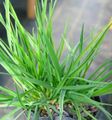Koeleria macrantha
- Latin Name: Koeleria macrantha
- Family: Poaceae
- Common Names: Koeler's prairie grass, prairie junegrass
- Synonyms/Misapplications: Koeleria cristata, Koeleria gracilis, Koeleria nitida, Koeleria yukonensis
- Codon: KOEMAC
Contents
Taxonomy
Description
Native, perennial, cool season bunchgrass.[1]
Leaf sheaths are open, leaves are 1-2mm broad, and basally tufted.
Culms are 3-6 dm tall, topped with fluffy-appearing, congested inflorescences (4-13cm.) which form a spike-like panicle.
The spikelets are mostly 2-flowered and are borne on short pedicels with paleas shorter than the lemmas[2]
Bloom Period
May - June[2]
Distribution
Alaska south, on both sides of Cascades, to northern Mexico, east across most of North America to Atlantic.[3]
Habitat
Dry, sandy prairies; open woods; rocky slopes Dry, well-drained soils such as silts to loams to sandy loams. It has good tolerance to fire.[1]
Uses
Prairie junegrass is used as a component of native seed mixtures in revegetation of mined lands, heavy use areas and other surface disturbed lands.Prairie Junegrass acts as a early- seral species of previously water-stressed areas.[4]
Medium palatable for browsing animals and high palatability for grazing animals. Prairie junegrass is considered a fair to good forage for elk throughout the year and is desirable forage for deer and antelope in the spring and early summer.[1]
Photo Gallery
References
- ↑ 1.0 1.1 1.2 Ogle, Daniel G. 2012. Plant fact sheet for prairie junegrass (Koeleria macrantha). USDA-Natural Resources Conservation Service, Boise, ID
- ↑ 2.0 2.1 Bowcutt, F., & Hamman, Sarah. (2016). Vascular plants of the South Sound prairies (First ed.). Olympia, Washington: The Evergreen State College Press.
- ↑ Hitchcock, C. L., Cronquist, A., Giblin, D., & Legler, B. et al. (2018). Flora of the Pacific Northwest: an illustrated manual. Seattle: University of Washington Press.
- ↑ Simonin, Kevin. 2000. Koeleria macrantha. In: Fire Effects Information System, [Online]. U.S. Department of Agriculture, Forest Service, Rocky Mountain Research Station, Fire Sciences Laboratory (Producer). Available: https://www.fs.fed.us /database/feis/plants/graminoid/junroe/all.html [2020, June 9].



